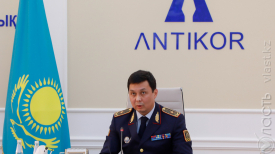- ВКонтакте
- РћРТвЂВВВВВВВВнокласснРСвЂВВВВВВВВРєРСвЂВВВВВВВВ
On November 26, Kassym-Jomart Tokayev was inaugurated as president during a formal ceremony, after winning a landslide victory at presidential elections just days earlier. One of the first policies that Tokayev announced focused on the development of rural areas in the country.
Tokayev also announced that the government would soon lay out a plan to recover assets that had been illegally offshored in previous years and decades.
In addition, Tokayev called for early elections to renew half of the members of the Senate, effectively opening another election season for early 2023. One of the first results of this new political impetus was the registration of the Baitaq Party, a self-described ecological movement established in 2016, headed by Azamatkhan Amirtai, a former government official and state-owned company manager.
Tokayev flew to Moscow to meet President Vladimir Putin. Among other topics, they discussed the establishment of a Tripartite Gas Union between Russia, Kazakhstan, and Uzbekistan. The three countries are natural gas exporters.
By presidential order, four regional governors were replaced: Aidarbek Saparov was appointed as the new governor of the Northern Kazakhstan region; Kumar Aksakalov took the post of governor in the Kostanai region; Nariman Turegaliyev became the new governor of the Western Kazakhstan region; in Pavlodar region, previous governor Abylkair Skakov was fired and his replacement has yet to be appointed. While several other governors and mayors were confirmed, four more regions are still waiting for their top politician to be confirmed or removed.
On the night of November 26, a few hundred followers of a nationwide multilevel marketing scheme rallied in Astana, demanding to be allowed to hold their convention at a nearby arena. The authorities shut internet connection in a couple of points of the city (coincidentally also turning off a switch that was also serving the nearby city of Karaganda), the police detained almost immediately dozens of the protesters. On November 27, Marat Abiyev, the organization’s leader, was detained for 15 days.
The failure of a thermal and power plant in Ekibastuz, 300 kilometers to the east of Astana, left households in the small extractive city without heating for days. The rigid winter, with temperatures nearing -30 degrees Celsius, meant that the situation turned into a humanitarian crisis. In Petropavlovsk
Serik Zhumangarin, minister of trade, said on Tuesday that the government is not planning to lower the tariff for grain transit via rail. Earlier, Russia’s state-owned railway company had requested a lower tariff, in line with Eurasian Economic Union regulations.
Around 100,000 Russians have remained in Kazakhstan, two months after the so-called “partial mobilization” called by the Russian government to send soldiers to the front of the war against Ukraine. More than 400,000 have crossed into Kazakhstan since September 21, but most have moved on to other countries.
Kairat Boranbayev, a wealthy businessman who was arrested in March on embezzlement charges will remain in pre-trial detention until January, a court said. He also owns the franchise that managed McDonald’s fast food stores in Kazakhstan, which shut their doors in mid-November. This week, the franchise said it closed its stores solely because of a supply-chain issue, not because of Boranbayev’s legal troubles.
Official statistics showed that in the first 11 months of the year prices have grown by 19%. Purchasing power has declined sharply as well, since the national currency also has weakened against the US dollar.
France’s TotalEnergies said on December 1 that it agreed to sell its 60% stake in the Dunga oil field in the west of Kazakhstan to a little known local company for $330 million. In the past few years, TotalEnergies has been vocal about divesting from its non-core oil and gas assets.
Поддержите журналистику, которой доверяют.








